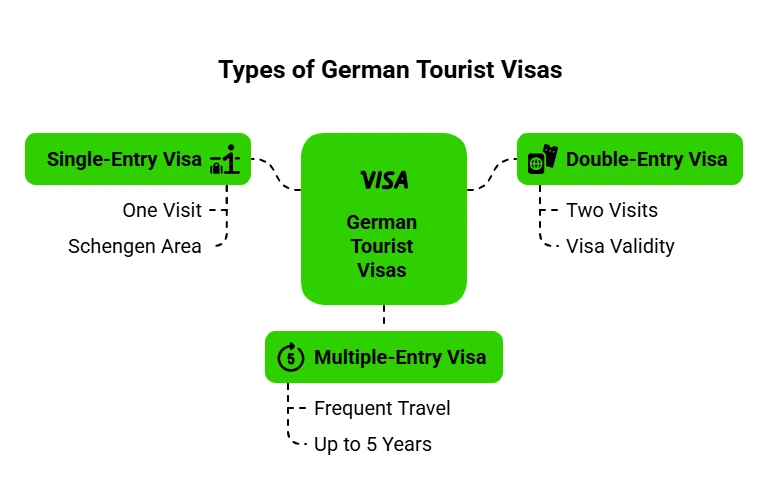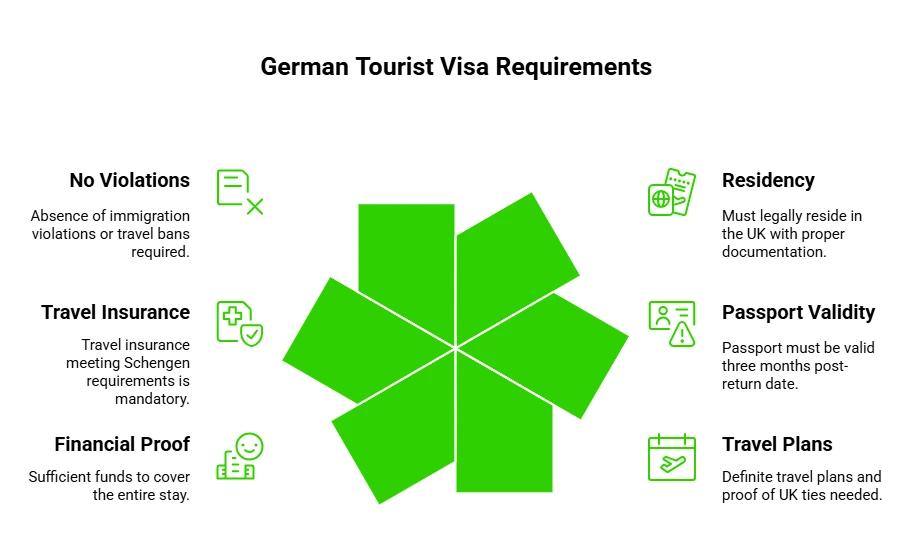For UK residents planning a trip to experience Germany's culture, cities, and scenery, here's what you need to know about applying for a tourist visa.
.webp)
*Want guidance to apply for Germany Tourist Visa? Sign up with Y-Axis for comprehensive support with the process.
The German Tourist Visa, a Schengen short-stay visa (Type C), lets non-EU citizens, and some UK residents, enter Germany for tourism. This includes activities like sightseeing, holidays, or seeing friends and family. It allows stays of up to 90 days in a 180-day period and travel to other Schengen countries while the visa is valid. UK citizens don't need a visa for short visits, but non-British people living in the UK (with a visa or permit) usually must apply before going to Germany.
Germany, a top destination for UK travelers, combines history, culture, and modern appeal. A tourist visa lets you see castles, villages, and cities such as Berlin and Munich. The visa allows travel in the Schengen Zone, giving access to many European countries. Germany offers museums, markets, drives, food, and a user-friendly travel system for a rich holiday.
The different kinds of German tourist visas are given below.
With all of these visas, you can stay for no more than 90 days within a 180-day period.

Citizens of the UK with British passports can visit Germany for up to 90 days without a visa. Non-British citizens who live in the UK must get a Schengen visa before going to Germany. EU/EEA citizens do not need a visa.
Short Stays (≤ 90 Days Schengen)
Long-Stay Visa (D‑Visa) & Residence Permit
Airport Transit Rules
To apply for a German tourist visa from the UK, you need to meet these conditions:

To apply for a Germany Tourist Visa, you will need to submit the following documents:
| Document | Details |
| UK Biometric Passport | Valid for entire stay in Germany |
| Proof of Purpose | Travel itinerary, employment letter, university enrollment, family documents |
| Travel Health Insurance | Coverage up to €30,000 for short stays (D‑visa for long durations) |
| Accommodation Proof | Hotel bookings or rental contracts |
| Financial Means | Bank statements or sponsorship demonstrating sufficient funds |
Step 1: Confirm if you need a visa (UK passport holders typically do not for visits under 90 days).
Step 2: If required, complete the Schengen visa application form online.
Step 3: Book an appointment with TLScontact (Germany’s official visa partner in the UK).
Step 4: Attend your biometric appointment and submit supporting documents.
Step 5: Wait for the visa decision (processing time is usually within 15 calendar days).
Step 6: Receive your visa and travel to Germany. Ensure your passport is stamped at the border.
Step 1: Determine your visa type (e.g. work, study, family reunion, freelance).
Step 2: Gather all required documents, including proof of purpose, insurance, and financial means.
Step 3: Apply online and book an appointment with th German Embassy in London.
Step 4: Attend your appointment, submit biometrics, and complete the interview.
Step 5: Wait for a decision (typically processed within 4 to 12 weeks).
Step 6: Upon visa approval, travel to Germany and register your address within 14 days of arrival.
Step 7: Apply for your residence permit at the local Ausländerbehörde (Foreigners’ Office) within 90 days.
.webp)
Detailed information about the fees for Germany Tourist Visa are given below.
| Applicant Category | Visa Fee |
| Adults (12 years and above) | £76.50 (€90) |
| Children aged 6–12 | £38.30 (€45) |
| Children under 6 | Free |
| VFS/TLS Service Fee | £20–£25 |
| Optional Services (SMS, courier) | Varies |
Detailed information about the processing time for Germany Tourist Visa is given below.
| Stage | Estimated Timeframe |
| Appointment Availability | 1 to 4 weeks |
| Standard Visa Processing | 10 to 15 working days |
| Extended Processing (if required) | Up to 30–45 days |
| Recommended Application Window | At least 4 to 6 weeks in advance |
Detailed information about the validity and duration of stay offered by a German Tourist Visa is given below.
| Category | Details |
| Maximum Stay Duration | Up to 90 days within any 180-day period |
| Visa Validity Period | Varies by visa type and consulate decision; may be longer than stay period |
| Entry Types Available | Single-entry, double-entry, or multiple-entry |
| Schengen Area Access | Yes — travel permitted across all 27 Schengen countries |
| Stay Limit Rule | Rolling 180-day window — monitor travel days carefully |
| Overstay Consequences | Possible fines, visa bans, or future application rejections |
Yes, a German Tourist Visa can be extended under special circumstances. Tourist visa extensions are only given for serious reasons:
You must ask local officials for the extension before your visa runs out. Wanting to travel more or stay longer is not a good reason to extend your visa.
Your travel insurance should meet these requirements:
If your application is denied, you can apply again, but be sure to fix any problems with your documents first.
Y-Axis can guide UK residents through each step of applying for a German Tourist Visa. We offer:
Explore what Global Citizens have to say about Y-Axis in shaping their future
Canada Work Permit Visa
Deepak Jain provided us with great Y-Axi
Read More...
Canada Work Permit Visa
Varun provided us with great Y-Axis Revi
Read More...
Job Search Services
Our client here has enjoyed all the adva
Read More...
Yes, you can explore other countries with a Germany Tourist Visa. The Germany Tourist Visa is a Schengen visa, letting you visit all 27 Schengen countries while you're here. You can go to France, Italy, Spain, Austria, and other countries without extra visas. Just be sure that Germany is either your main destination or the first country you enter. This is good if you're planning a European trip that includes multiple countries, since it lets you travel without border checks within the Schengen Area.
A Germany Tourist Visa (Schengen Type C) usually permits stays of up to 90 days in a 180-day window. How long the visa is valid depends on your application, travel record, and what the consulate decides. You might get a visa that lasts from a few weeks to as long as 5 years for many entries, but each visit can't be longer than 90 days. Keep good records of your stay to not go over the time limit, as this can cause issues with getting visas approved later.
Yes, the Germany Tourist Visa is easy to apply, provided you meet the eligibility conditions and submit accurate information. For non-British residents in the UK, the application process is direct. Applications go through TLS contact or the German consulate. If you have the correct documents, approval usually goes without problems. You'll need to show your UK residence permit, proof of funds, your planned trip, and travel insurance. Most people hear back in 10 to 15 working days. This makes it easy for those who qualify to visit Germany for tourism or to see family.
Yes, you can apply for a multiple-entry German Tourist Visa. Multiple-entry visas can be obtained by those who meet the requirements and have a solid travel background. With these visas, you can enter and leave the Schengen Area as many times as you like while the visa is still good—usually for up to one or two years, but sometimes for five. You still have to follow the rule of staying no more than 90 days within any 180-day window. This is a great choice for people who travel a lot or who visit family in Europe. To be considered, you need to have travelled responsibly in the past and provide documents that show why you need to enter the area more than once.
Yes, you can use bank statements as financial proof. Bank statements from UK banks can serve as proof that you have enough money. Usually, you need to provide statements from the last three months that show you have a steady income and enough balance to cover your stay. This lets visa officers know you can pay for housing, travel, and daily costs while in Germany. Check that the statements show your name, account number, and the bank's logo. If you print the statements online, some visa centers might ask for an official stamp or signature from the bank.
Yes, you can include an invitation letter if you are visiting friends and family. A letter of invitation from a host in Germany can support your visa application, especially for personal visits. This letter should have your host's name, address, phone number, and explain your relationship. It should also state the reason for your visit and how long you plan to stay. If your host is paying for your housing or other costs, they should say so in the letter and include evidence of their financial situation or residency status. The letter aids in confirming the reason for your visit and your travel schedule.
Yes, you can apply for a Germany Tourist Visa if you are travelling to Germany for the first time. First-time applicants for Schengen visas are encouraged to apply if they meet the requirements and provide complete and correct documents. A solid application should include a clear travel plan, lodging proof, return flight tickets, proof of funds, and travel insurance, which can raise your chances of approval. The consulate does not discriminate against first-time travellers; many applicants get visas on their first try. Make sure to clearly state the reason for your travel and show that you plan to return to the UK.
Yes, you can track your Germany Tourist Visa application after submitting it. Once you have submitted your application through TLScontact or the German consulate, you can follow its progress on the official visa center site. Use the tracking number or application reference you were given to check the status when you want. Some centers will send updates by SMS or email. Also, you can choose to have your passport delivered by courier after a decision has been made on your visa.
Yes, travel insurance is required to apply for a Germany Tourist Visa. The insurance should meet Schengen standards, such as a minimum of €30,000 coverage for medical emergencies, hospitalization, and repatriation. The policy needs to be good for your entire stay and cover all Schengen countries, not only Germany. Your visa won't be approved without valid travel insurance. You can get insurance that meets Schengen requirements from UK or international providers and add the certificate to your visa documents. This step is important for your safety and the success of your application.